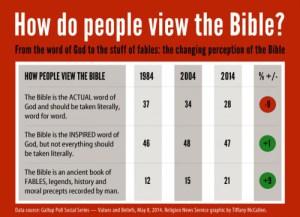
Oliver: You do know that “The Three Musketeers was a fiction, right? Written by Alexander Dumas?
Gary King: A lot of people are saying that about the Bible these days.
Steve Prince: What, that it was written by Alexander Dumas?
Gary King: Don’t be daft, Steve! It was written by Jesus!
— The World End, Simon Pegg, Edgar Wright, Nick Frost
I do have a soft spot for The Cornetto Trilogy of movies. And in the particular scene I’m quoting above, there’s a stray comment that resonates with me strongly. As I talk to different people – I do get the sense that many folks today are coming to the opinion that the Bible is simply a bundle of myths – and it has no place being taken seriously by any thinking person.
You don’t need to watch a movie to sense it either. Look at the Gallup Poll that was done recently. The view that the Bible is an ancient book of Fables has grown 9% in 30 years.

And yet – when one actually takes a cursory glance at the evidence – the evidence for the Bible as Myth or Fable just isn’t there.
What do we mean by Mythology? Ancient mythologies have many forms. For example:
- From Rome, the Greek hero Hercules.
- The Norse fertility goddess Freyja, the daughter of the sea god Njord.
Popular modern mythologies we could point to would be Tolkein’s Lord of the Rings saga, or George Lucas’ ongoing Star Wars saga.
Mythology is there for a purpose; it has its own internal truth and logic, it tells an important fictional tale containing themes that people will naturally relate to.
Yet the evidence suggests that the Bible is a very different library of literature.
Unlike Mythology, the Bible has a solid, historical framework. People pop up who are mentioned outside of the Bible in surviving world history. Take the Babylonian King Nebuchadnezzar II (634 – 562 BCE); history documents the alliance he secured with the Medes, his defeat of the Egyptians and much more besides. Including his part in the Babylonian exile of the Jews that the Bible explores in the Books of Daniel and Jeremiah. Yet we’ve hardly touched the tip of the iceberg. The Bible’s history coincides with Cyrus, Herod, Felix and Pilate. Its narrative calls out the Hittite, Egyptian and Persian nations and many more. And the action occurs in geographical areas such as Canaan, Syria, Egypt, Mesopotamia, etc.
Unlike Mythology, the Bible has many confirmations amongst the sciences. Take Archaeology, for example. The Old Testament book of Exodus tells the tale of Moses leading the Israelites out of slavery in Egypt, and eventually entering and occupying the land of Canaan. In the Ancient near Eastern culture, these nations would create things called “Stelas” – effectively memorial stone inscriptions. Similar to our monuments celebrating the end of the First World War (for example). Well – in 1896, the Merneptah Stela was discovered in Thebes. Dating from 1200 BCE it recounts Pharaoh Merneptah’s victories. But it also happens to recount the existence of a people group called Israel who had occupied Canaan by that point in history. The Merneptah Stela is one of the most ancient records of the nation of Israel.
Unlike Mythology, so much of the Bible is actually presented as documented history. Luke, for example, claims of his gospel that he had “carefully investigated everything from the beginning” and so wrote an “orderly account…so that you may know the certainty of the things you have been taught.” (See Luke 1:1-4) The book of 2 Chronicles makes a side reference to the Queen of Sheba visiting King Solomon apparently to engage in trade negotiations. And – indeed – historians know from studying artifacts and inscriptions in ancient remains, that Israel was indeed trading with a number of countries – including Sheba – 900 BCE. The events of Solomon’s life and reign as king of Israel are set to the backdrop of history.
Unlike Mythology, the Bible contains many fulfilled prophecies. Predictions about how things will play out in the real world. It has been estimated that up to a third of the entire Bible deals with prophecy in some way, shape or form. The Old Testament, for example, contains more than 300 prophecies that are all fulfilled in the person of Jesus Christ who lived hundreds of years after the original texts were written (we know that because of the internal evidence of the text itself, and the external evidence of history, ancient copies and archaeology). This makes perfect sense – if God exists, as the Bible assumes from the beginning, then he is going to know how things will play out.
Of course not every book in the Bible is historical narrative. The Psalms contain songs; Proverbs recounts Solomon’s wise sayings. To understand the Bible, we must first understand the style of the text we have before us. But whatever the genre, it contains an honest expression of someone’s real and down to earth experience. One cannot dismiss it as a made up tale; human history does not permit it.
I’m as fond of stories as the next guy – probably more. So was J.R.R Tolkein, who said this:
“Fantasy remains a human right; we make in our measure and in our derivative mode, because we are made: and not only made, but made in the image and likeness of a Maker.” – J.R.R Tolkein
I agree – our love of creating and exploring fictional world’s points to the similarity between us and our creator – who has expressed Himself to us thru the ancient, true stories of men and women in the Bible.

